TRANSPARENCIES
a monthly newsletter from Integral Care
a monthly newsletter from Integral Care

A Conversation: Ellen Richards and Karen Ranus
 Women are twice as likely as men to experience depression. Twice as likely to attempt suicide. The differences in how women experience mental health are real. Research identifies disparities between men and women in terms of risk, prevalence, presentation and treatment sought and received. For this month’s Transparencies, our Chief Strategy Officer, Ellen Richards and NAMI Austin’s Executive Director, Karen Ranus, talk about women’s mental health and how our community is addressing mental health issues.
Women are twice as likely as men to experience depression. Twice as likely to attempt suicide. The differences in how women experience mental health are real. Research identifies disparities between men and women in terms of risk, prevalence, presentation and treatment sought and received. For this month’s Transparencies, our Chief Strategy Officer, Ellen Richards and NAMI Austin’s Executive Director, Karen Ranus, talk about women’s mental health and how our community is addressing mental health issues.
Ellen: As Mental Health Month and Women’s Health Week are both in May this is a perfect opportunity to talk about women’s mental health. Biological differences, social determinants of health and unconscious bias impact women’s well-being and our experience with the healthcare system.
Karen: More than most of us realize, Ellen. For one thing, many of us are trying to be Superwoman – juggling careers, relationships, children and aging parents. Women naturally fall into the caregiving role more often than men. So we end up trying to do it ALL. The consuming nature of caregiving sneaks up on us and often we don’t realize how it impacts our mental health. Women can be so dedicated to looking out for others that we neglect to take care of ourselves.
Ellen: Men and women do have similar rates of mental illness, but experience it in different ways. Women are twice as likely to have depression, anxiety and PTSD compared with men. Incidentally, providers are more likely to diagnose depression and prescribe psychotropic medication for women compared with men – even when symptoms are identical or they score similarly on depression screenings. This can be due to unconscious bias.
Karen: That’s interesting. You know, other social factors affect women’s health, like sexual or physical abuse, and the fact that more women are working lower income jobs than men. One of the biggest issues our communities face is that so many Americans with mental illness struggle to find and afford care – 56%. Many go without any treatment. And across the country, those who do seek treatment often face high rates of denials of care by insurers or high out-of-pocket costs for mental health care.
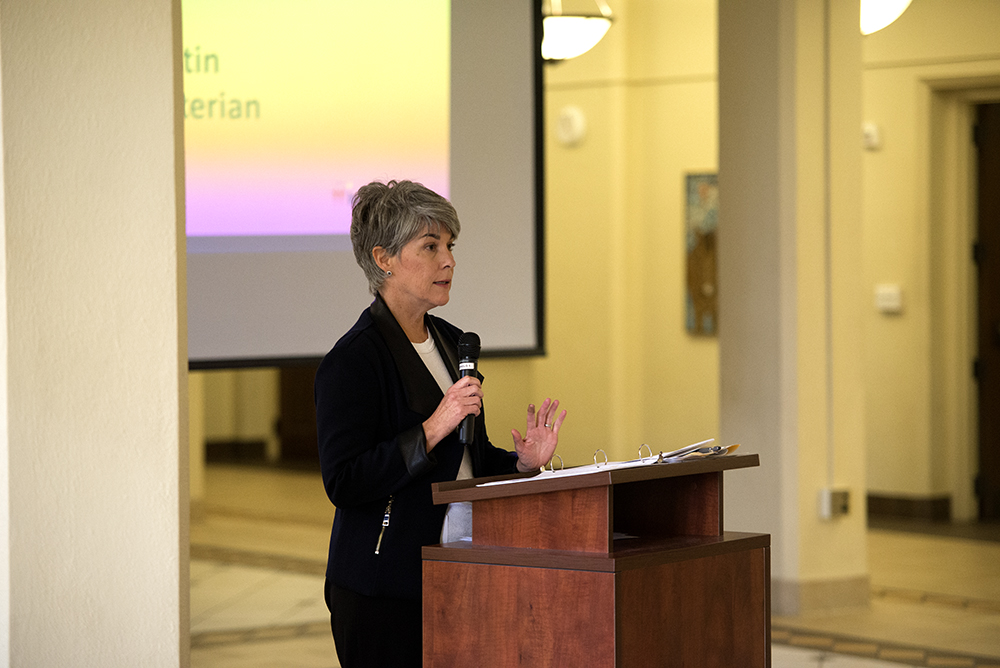 Ellen: Yes, mental health parity and a strong, local system of care is critical to helping everyone get the care they need. Last session House Bill 10 passed, expanding the state’s parity enforcement authority to ensure that mental health coverage is treated the same as physical health coverage. This legislative session, when it comes to women’s health, we’re excited about various bills prioritizing women’s health. House Bill 992 would establish a women’s health advisory committee to provide recommendations to HHSC on women’s health programs. This committee would be composed of health care providers currently participating in women’s health programs and representatives of the women’s health industry. House Bill 1110 would extend medical assistance to 12 months for mothers following the date they deliver a baby, bringing better treatment to the 10 to 15% of women who experience post-partum depression. Senate Bill 436, would improve mental health outcomes for women with opioid use disorder, and their newborn children. When our elected officials truly understand the needs of our communities they can have a tremendous impact on access to care and health. Enacting laws that make mental health a priority makes our communities stronger and more resilient.
Ellen: Yes, mental health parity and a strong, local system of care is critical to helping everyone get the care they need. Last session House Bill 10 passed, expanding the state’s parity enforcement authority to ensure that mental health coverage is treated the same as physical health coverage. This legislative session, when it comes to women’s health, we’re excited about various bills prioritizing women’s health. House Bill 992 would establish a women’s health advisory committee to provide recommendations to HHSC on women’s health programs. This committee would be composed of health care providers currently participating in women’s health programs and representatives of the women’s health industry. House Bill 1110 would extend medical assistance to 12 months for mothers following the date they deliver a baby, bringing better treatment to the 10 to 15% of women who experience post-partum depression. Senate Bill 436, would improve mental health outcomes for women with opioid use disorder, and their newborn children. When our elected officials truly understand the needs of our communities they can have a tremendous impact on access to care and health. Enacting laws that make mental health a priority makes our communities stronger and more resilient.
Karen: That is why I’m such a vocal and passionate advocate. Our lawmakers have the power to help build better lives for all Texans affected by mental illness.
Ellen: Beyond lawmakers, the fact that you and others share their own experiences so openly is changing the mental health conversation in our community. We still have progress to make when it comes to accepting mental illness as a brain-based disorder – deserving the care, treatment and respect of a physical illness affecting any other part of the body. It’s OK to have a mental illness and talk about it. NAMI Austin’s support in our community really empowers people to speak up and reach out to one another.

Karen and her 3 daughters
Karen: Thanks, Ellen. I just know that when my oldest daughter attempted suicide in 2011, shame and silence surrounded me and my family. Comparing it to my mother’s diagnosis of cancer a few years earlier, it was a totally different experience. With the news of my mom’s physical illness, friends, neighbors, and our church showered us with support. People stopped by with casseroles and offers of help that “fed” us physically and spiritually. Then, 17 months after my mother’s death, I almost lost my 18-year-old daughter to suicide. I felt lost and alone. We brought her home from the psychiatric hospital, and, like any serious health issue, her intense care left us feeling overwhelmed, fearful and lost.
But unlike our experience with my mother, the casseroles and help never came. My friends are good people who care about my family. They simply didn’t know how to respond to mental illness.
Ellen: And yet mental illness is far more common than cancer.
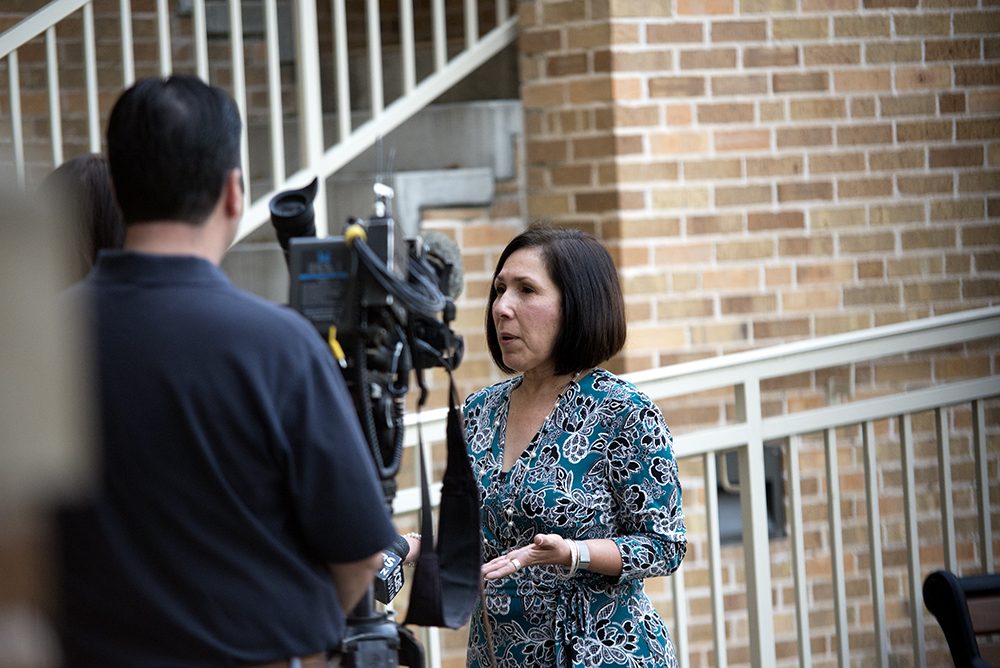 Karen: Exactly! When I found the NAMI Family-to-Family program, for the first time ever, I found people talking openly about mental illness. They shared their stories, lent their support and resources. It was eye opening and life changing.
Karen: Exactly! When I found the NAMI Family-to-Family program, for the first time ever, I found people talking openly about mental illness. They shared their stories, lent their support and resources. It was eye opening and life changing.
Ellen: I’m so thankful that you found NAMI Austin. Sharing our stories really is an important step to reducing the stigma around mental health. In your role with NAMI, you are changing the conversation by bringing mental illness out of the shadows. That saves lives.
Karen: I think the thought of saving just one life brings both of us to work every day. That’s the driving force and motivation for doing what we do, isn’t it?
Ellen: Absolutely. This is meaningful work and a large part of it is empowering our community to be aware and open to discussing mental health. Just knowing the signs and symptoms of a mental illness is a powerful tool for people. Since men and women may experience mental illness differently, their symptoms may be different. For example, with depression or anxiety, men are more likely to self-medicate with alcohol or drugs and appear angry. Women are more likely to express sadness and hopelessness.
The fact that women tend to be more willing to talk about feelings could be one of the reasons their symptoms may be different than men. That willingness to share feelings with friends and support systems also protects women from developing illness.
Karen: You’re absolutely right. Women’s innate skill of connecting with others is a powerful tool. Women have the power to change the conversation around mental health, bring it out of the shadows, create change in our health care system and improve mental health care for everyone.
Ellen: Karen, I want to thank you for your amazing leadership at the head of NAMI Austin. I know that I have learned so much watching you work and am inspired by your passion and advocacy.
Texas women are consistently strong advocates for mental health and use their platforms to move the narrative forward to improve the lives of people across our state. From introducing legislation, to direct involvement in planning, it is important for us to recognize the various efforts of strong women leaders in mental health.
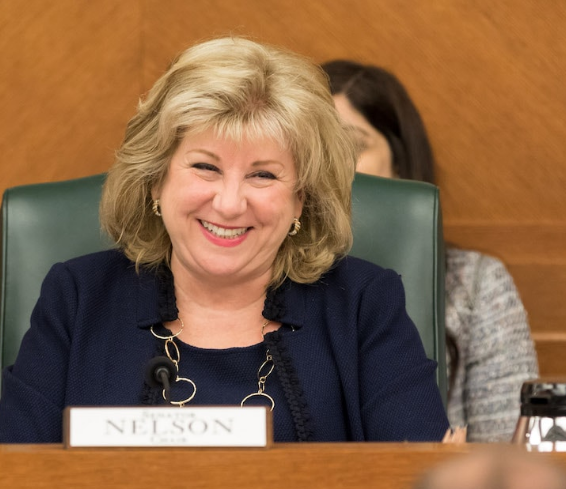 State Senator Jane Nelson’s Senate Bill 55 established the Texas Veterans + Family Alliance grant program in 2016. HHSC awarded up to $20 million in state funds over the 2018-19 biennium to be matched by grantees with local and private funds. The grants help expand and coordinate access to mental health and supportive services for veterans and their families. Examples of services include face-to-face counseling and tele-counseling in rural communities, continuity of care services to help veterans transition from military to civilian life, and transportation coordination to help veterans and families access mental health services.
State Senator Jane Nelson’s Senate Bill 55 established the Texas Veterans + Family Alliance grant program in 2016. HHSC awarded up to $20 million in state funds over the 2018-19 biennium to be matched by grantees with local and private funds. The grants help expand and coordinate access to mental health and supportive services for veterans and their families. Examples of services include face-to-face counseling and tele-counseling in rural communities, continuity of care services to help veterans transition from military to civilian life, and transportation coordination to help veterans and families access mental health services.
This session, Senator Nelson has come back with the same passion and energy. She stated, “I will focus heavily on mental health this session and am working on many fronts to increase access to mental health screenings and services, especially for children and adolescents.” She introduced Senate Bill 10, which creates the Texas Mental Health Care Consortium, fostering collaboration among health-related institutions with the goal of improving early identification and access to mental health services, addressing psychiatry workforce issues, coordinating mental health research and strengthening judicial training on juvenile mental health.
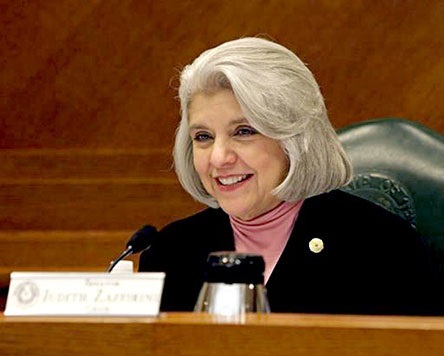
State Senator Judith Zaffirini has led or served on health and human service committees in the Senate for more than two decades. Last session she sponsored House Bill 10, which expanded the state’s parity enforcement authority to enforce our laws to ensure that mental health coverage is treated the same as physical health coverage. She also authored Senate Bill 1326, which places an emphasis on community-based and jail-based treatment to restore inmates’ mental competence. This means fewer inmates will have to wait for a state hospital bed. Now, she continues her efforts toward improving mental health for Texans by filing legislation addressing mental health public defenders for indigent individuals, filing requirements in court proceedings involving individuals with mental illness, and integration of treatment for mental illness and substance use disorder in the same settings.
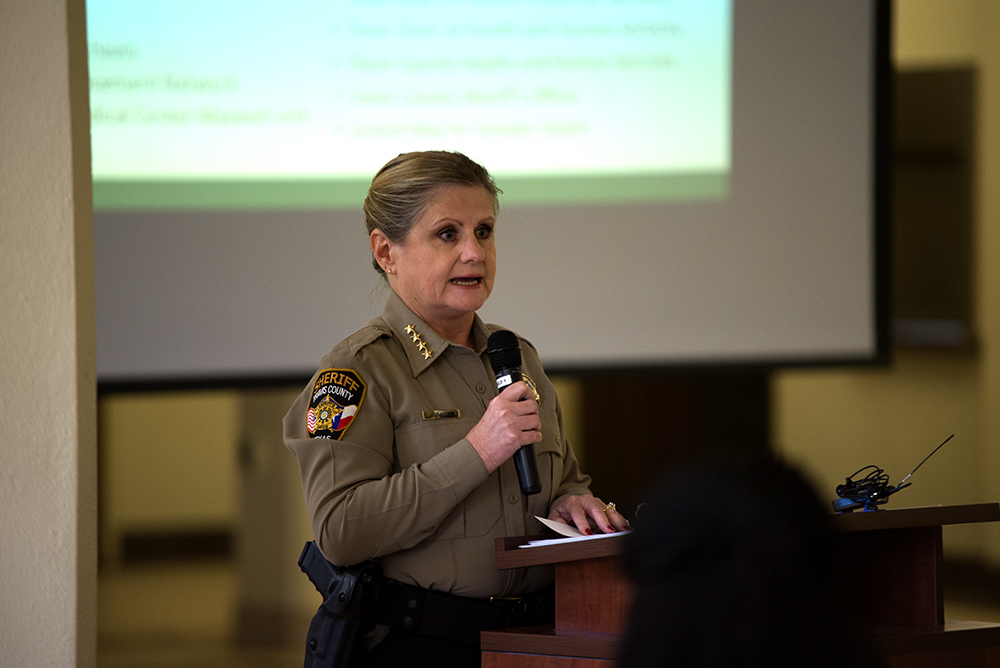
Travis County Sheriff Sally Hernandez has worked in law enforcement for nearly 35 years, committing herself to addressing the criminalization of people living with mental illness. Sheriff Hernandez supports efforts around diversion by building and maintaining relationships with mental health services and providers. She co-chaired The Children’s Mental Health Crisis Services Task Force with Integral Care Trustee Emmitt Hayes, working tirelessly to analyze our current system and identify opportunities for improvement for children experiencing a mental health crisis. Her team partners with NAMI Austin to bring information and classes to inmates and their families. The Sheriff is also a member of the Psychiatric Stakeholders Services Committee, a forum for key mental health stakeholders to strengthen the local mental health crisis system, with a focus on unfunded populations.
Texas’s strong women leaders, who are advocating for mental health services, awareness and support, are key players in building health and well-being for adults and children living with mental illness, substance use disorder and intellectual and developmental disabilities (IDD). They push our community to reach its full potential.
April: Legislative Session Status Report
March 2019: Making Opportunities for Recovery More Accessible
February 2019: Recovery is Possible
January 2019: Stronger Outcomes Through Collaboration
December 2018: Looking ahead to the 86th Texas Legislature
November 2018: How Tech is Changing the Face of Mental Health
October 2018: A Few Questions Could Help Save a Life
September 2018: Anyone Can Save a Life
August 2018: A Milestone Moment
July 2018: Equity in Mental Health Care for All
June 2018: Expanding Services for Veterans
May 2018: Your Mental Health Toolkit
April 2018: Time of Terror Calls for Increased Emotional Support
March 2018: Stopping the cycle of incarceration for individuals with mental illness
February 2018: Equity in mental healthcare for everyone
January 2018 : Improving Mental Health Through Partnership & Collaboration
December 2017: Strength Through Community
November 2017 : Healthy Lifestyles Improve Well-Being
October 2017 : National Child Health Day
September 2017 : Strengthening Families and Communities